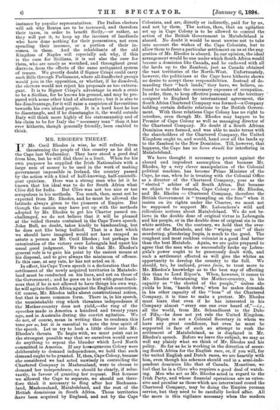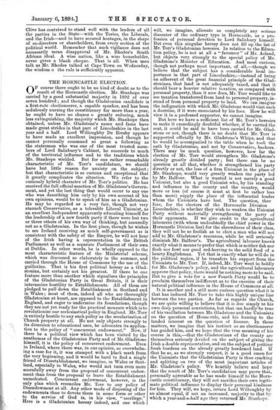MR. RHODES'S THREAT.
IF Mr. Cecil Rhodes is wise, he will refrain from threatening the people of this country as he did at the Cape last Wednesday. They have stood a good deal from him, but he will find there is a limit. When for his own purposes he supplied the Irish Nationalists with a large sum of money to be used in the work of making government impossible in Ireland, the country passed by the action with a kind of half-knowing, half-unintelli- gent cynicism. Here was a strong man who let it be known that his ideal was to do for South Africa what Clive did for India. But Clive was not too nice or too scrupulous in his methods. Too much, then, must not be expected from Mr. Rhodes, and he must be allowed the latitude always given to the pioneers of Empire. But though the nation may have put up with the methods adopted by Mr. Rhodes to get his Charter passed un- challenged, we do not believe that it will be pleased at the veiled threats contained in the Cape Town speech. John Bull, no doubt, takes kindly to bamboozling, but he does not like being bullied. That is a fact which we should have imagined would not have escaped so Astute a person as Mr. Cecil Rhodes ; but perhaps the intoxication of the victory over Lobengula had upset his usual good judgment. We take it that Mr. Rhodes's general rule is to gain his point by the easiest means at his disposal, and to give always the minimum of offence. In this case, at any rate, he has not acted on it. In effect, his Cape Town speech is a declaration that the settlement of the newly acquired territories in Matabele- land must be conducted on his lines, and not on those of the Government ; and he goes on to hint with great frank- ness that if he is not allowed to have things his own way, be will agitate South Africa against the English connection. Of course, Mr. Rhodes talks about constitutional action, but that is mere common form. There is, in his speech, the unmistakable ring which threatens independence if the Mother-country does not yield,—the ring of the speeches made in America a hundred and twenty years Ago, and in Australia during the convict agitation. We do not, of course, mean in writing thus to condemn this tone per se, but it is essential to note the true spirit of the speech. Let uS try to look a little closer into Mr. Rhodes's threats. To begin with, we must point out in the strongest possible way that we ourselves would never do anything to repeat the blunder which Lord North committed in America. If any homogeneous Colony were deliberately to demand independence, we hold that such demand ought to be granted. If, then, Cape Colony, because she considered we had acted unwisely in controlling the Chartered Company in Mashonaland, were to choose to demand her independence, we should be clearly, if reluc- tantly, in favour of granting her request. But because we allowed the Cape to separate, we should not there- fore think it necessary to fling after her Bechuana- land, Mashonaland, Matabeleland, and the rest of the British dominions in South Africa. Those territories have -been acquired by England, and not by the Cape Colonists, and are, directly or indirectly, paid for by us, and not by them. The notion, then, that an agitation set up in Cape Colony is to be allowed to control the action of the British Government in Matabeleland is absurd. No doubt it would be most unwise not to take into account the wishes of the Cape Colonists, but to allow them to force a particular settlement on us at the sug- gestion of Mr. Rhodes is absurd. In our opinion, the ideal arrangement would be one under which South Africa would become a dominion like Canada, and be endowed with all the lands up to the Zambesi, just as Canada obtained the vast territories of the North-West. Unfortunately, however, the politicians at the Cape have hitherto shown no desire to accept these responsibilities. Instead of de- manding their " back lands," they have, we believe, re- fused to undertake the necessary expenses of occupation. In order, then, to keep effective possession of the territory assigned to England by international agreement, the South Africa Chartered Company was formed—a Company holding certain definite relations to the British Govern- ment. With these relations Cape Colony has no right to interfere, even though Mr. Rhodes may happen to be Premier of Cape Colony as well as managing director of the Chartered Company. No doubt if a South African Dominion were formed, and was able to make terms with the shareholders of the Chartered Company, the United Kingdom ought to, and would, hand over all the lands up to the Zambesi to the New Dominion. Till, however, that happens, the Cape has no locus standi for interfering in Matabeleland.
We have thought it necessary to protest against the absurd and impudent assumption that because Mr. Rhodes, by a very clever manipulation of the Colonial political machine, has become Prime Minister of the Cape, he can, when he is treating with the Colonial Office as a director of the Chartered Company, pose as the " elected " arbiter of all South Africa. But because we object to the formula, Cape Colony = Mr. Rhodes, and Mr. Rhodes = Chartered Company, therefore the British Government is "trampling on the free" when it insists on its rights under the Charter, we must not be supposed to support Mr. Labouchere's wild and ridiculous notions about Matabeleland. We do not be- lieve in the double dose of original virtue in Lobengula and his people, or in the double dose of original sin in the white settlers. On the contrary, we hold that the over- throw of the Matabele, and the " wiping out " of their murdering, plundering Impis, is much to the good. The roughest and most reckless colonist is a good deal better than the best Matabele. Again, we are quite prepared to agree that the men who so successfully broke up Loben- gula's power ought to be generously dealt with, and such a settlement effected as will give the whites an opportunity to develop the country to the full. We should, too, be inclined, prima facie, to trust more to Mr. Rhodes's knowledge as to the best way of effecting this than to Lord Ripon's. When, however, it comes to Mr. Rhodes threatening the Mother-country, in his capacity as " the elected of the people," unless she yields to him, `hands down,' when he makes demands in his other capacity of the " boss " of the Chartered Company, it is time to make a protest. Mr. Rhodes must learn that even if he has interested in his Company almost " every one one ever heard of,"—i.e., all 'the world, from Mr. Schnadhorst to the Duke of Fife,—he does not yet rule the United Kingdom. Lord Ripon is not a Colonial Secretary in whom we have any great confidence, but even he must be supported. in face of such an attempt to rush the settlement of Matabeleland, as is displayed in Mr. Rhodes's speech. Before we leave the subject, we may as well say plainly what we think of Mr. Rhodes and his policy. So far as he is working in the direction of secur- ing South Africa for the English race, or, if you will, for the united English and Dutch races, we are heartily with him, even though his schemes should end in a semi-inde- pendent dominion like that of Canada. Meantime, we feel that he is a Clive who requires a good deal of watch- ing. Men who act as Mr. Rhodes acted in regard to the Irish Party, and whose financial operations are as exten- sive and peculiar as those which are intertwined round the Chartered Company, may be doing the Empire yeoman service, but they need to be carefully looked after. All the -more is this vigilance necessary when the modern Clive has contrived to stand well with the leaders of all the parties in the State—with the Tories, the Liberals, and the Irish—and to have secured hostages, in the shape of co-directors or shareholders, from every section of the political world. Remember that such vigilance does not necessarily mean disapproval of Mr. Rhodes's South African ideal. A wise nation, like a wise householder, never gives a blank cheque. That is all. When men talk as Mr. Rhodes talked at Cape Town on Wednesday, the wisdom o the rule is sufficiently apparent.











































 Previous page
Previous page